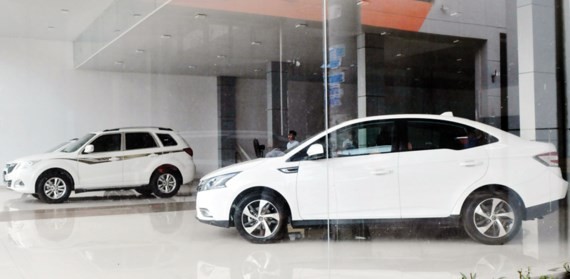
Since the end of 2016, auto companies have launched many promotional and discount programs to improve purchasing power. Of them, Truong Hai Auto Corporation has cut the price of Mazda by VND200 million. Kia and Peugeot prices have also reduced by VND30-95 million and VND30-70 million respectively since February.
Press information about price reduction of tens of auto brand names have caused customers hesitate to buy, slowing down the market.
The number of customers has dropped about 15-20 percent over the same period last year, reported Mr. Ngo Thanh Tri, head of Wester Ford outlet in An Duong Vuong street, Binh Tan said.
Ford Everest price has dropped VND46-135 million. Everest Trend 2.2L has slid to VND1.12 billion from VND1.25 billion. Honda CR-V has decreased VND90-115 million. A CR-V 2.4 AT TG is now sold at VND1.06 billion.
The price of three Camry versions has went down VND90 million to VND1-1.3 billion. In addition, Toyota Vios, Innova, Ford Focus and Honda Civic prices have reduced by VND50-80 million.
The price cut is not the policy of Toyota. It has been implemented by the company’s outlets to compete with other shops and reach sales target, according to a presentative of Toyota Eastern Saigon Company.
Experts in the auto industry said that the price drop is not only completely due to the coming zero percent tax rate but also many other reasons.
However, in fact auto prices have started sliding after the import tariff was cut from 40 percent to 30 percent from January 1, 2017 under the ASEAN Free Trade Area (AFTA).
With the 10 percent price cut, auto prices should slide from 5-7 percent. Still at present, it has dropped 15-20 percent. Not only automobiles imported from ASEAN but also products from manufactures in Vietnam and countries outside AFTA have reduced priced.
With the current trend, when tariff rate will be slashed to 0 percent next year, auto prices might continue sliding and demand will rebound. Still, a car’s total value might increase if tax and fee polices are changed, said a Western Ford representative.
Experts said that there are many factors affecting auto prices. For instance, if the Ministry of Finance adjusts value added tax, special consumption, corporate tax, environmental protection fees on petrol, road maintenance and registration fees, car prices will be affected.
Dr. Tran Minh Ngoc, economic expert from Industrial University of HCMC, said that auto price reduction has depended on market mechanism excluding policies. According to surveys, auto prices in VIetnam are higher than the Southeast Asian region. For instance, the average price in Vietnam is twice higher than in Thailand and Indonesia.
Auto assembly and trading in Vietnam is highly profitable. Therefore, businesses have been forced to reduce prices to compete with import products which have enjoyed tax advantages.
























